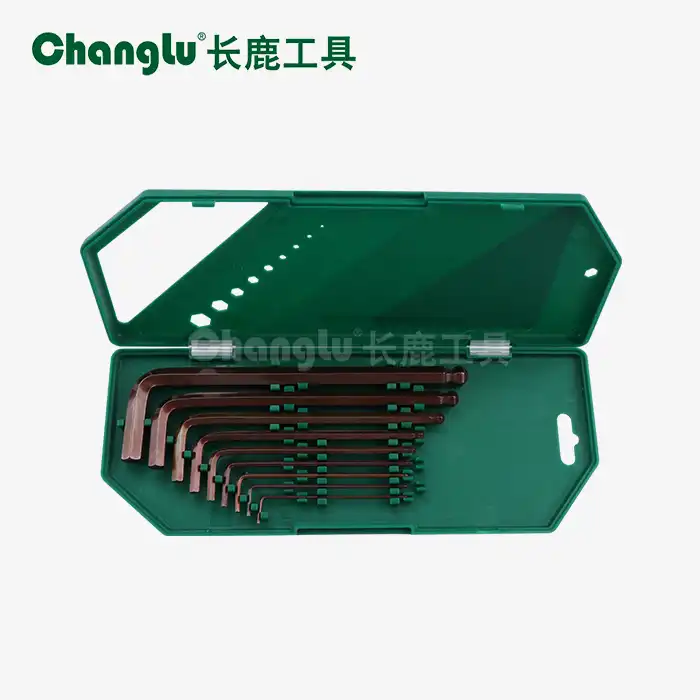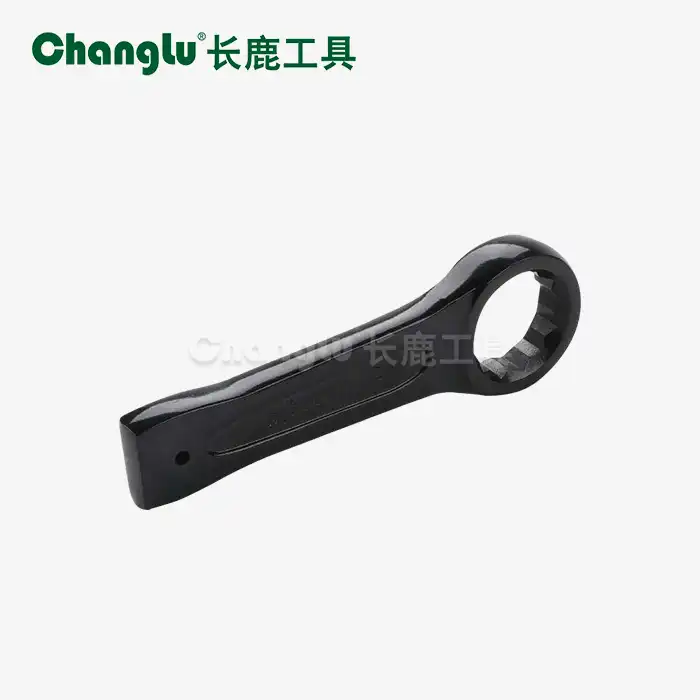In the world of hand tools, versatility and efficiency reign supreme. The open-end wrench with two ends is a great example of the phrase "one tool, endless possibilities." This important tool has changed the way professionals and do-it-yourselfers work because it is so flexible and simple to use. With its ability to tackle multiple bolt sizes and its compact design, the double ended open end wrench has become a staple in toolboxes across various industries. This device is capable of repairing automobiles or ensuring the efficacy of massive machinery. Because it is so useful and can be used in so many ways, this tool is thought to change the way binding solutions are made. Come look at it with us.
When to Use a Double Ended Open End Wrench
Double ended open end wrenches, also known as Double open-end spanner, are ideal for situations where:
-
Quick access to multiple sizes is necessary
-
Working in confined spaces with limited tool access
-
Dealing with hexagonal nuts and bolts
-
Performing routine maintenance and repairs
-
Tackling projects that require frequent switching between fastener sizes
These tools excel in various industries, including automotive repair, manufacturing, construction, and general maintenance. People who work with tools all the time need these since they can do many things.
Versatility in one tool: double ended open end wrench applications
The true beauty of the double ended open end wrench lies in its wide range of applications across numerous industries and tasks. Let's explore some of the key areas where this tool shines:
Automotive Repair and Maintenance
In the automotive world, double ended open end wrenches are invaluable. They're perfect for:
The ability to quickly switch between sizes makes these wrenches ideal for the varied fastener sizes found in vehicles.
Heavy Machinery Assembly and Disassembly
When it comes to working with large equipment, double ended open end wrenches prove their worth:
-
Assembling industrial machinery
-
Maintaining agricultural equipment
-
Servicing construction vehicles
-
Repairing mining equipment
The durability and leverage provided by these tools make them suitable for handling the substantial bolts and nuts often found in heavy machinery.
Industrial Equipment Servicing
In factory settings and industrial environments, double ended open end wrenches are essential for:
The versatility of these wrenches allows technicians to carry fewer tools while still being prepared for a variety of tasks.
Construction and Infrastructure Projects
On construction sites, double ended open end wrenches find numerous applications:
-
Erecting scaffolding
-
Assembling temporary structures
-
Installing plumbing fixtures
-
Securing electrical conduits
-
Fastening steel beams
The rugged design of these wrenches makes them well-suited for the demanding conditions of construction sites.
General Manufacturing Operations
In manufacturing facilities, double ended open end wrenches are crucial for:
-
Assembling product components
-
Adjusting machinery settings
-
Performing quality control checks
-
Maintaining production equipment
-
Repairing assembly line tools
The efficiency gained from using these versatile tools can significantly impact production speed and quality.

Metric and SAE pairings: choosing the right double ended open end wrench
Selecting the appropriate double ended open end wrench involves understanding the different sizing systems and how they're paired. The two primary systems are metric and SAE (Society of Automotive Engineers), also known as imperial.
Metric Wrench Pairings
Metric wrenches are sized in millimeters and typically come in the following common pairings:
-
6mm x 7mm
-
8mm x 9mm
-
10mm x 11mm
-
12mm x 13mm
-
14mm x 15mm
-
16mm x 17mm
-
18mm x 19mm
-
20mm x 22mm
-
24mm x 27mm
-
30mm x 32mm
These pairings, often in the form of a Double open-end spanner, are designed to cover a wide range of fastener sizes commonly found in metric-based machinery and equipment.
SAE Wrench Pairings
SAE wrenches are sized in fractions of an inch and often come in these pairings:
-
1/4" x 5/16"
-
3/8" x 7/16"
-
1/2" x 9/16"
-
5/8" x 11/16"
-
3/4" x 7/8"
-
15/16" x 1"
-
1-1/16" x 1
-
1/8"
These combinations are tailored to fit the most common bolt and nut sizes in imperial-based systems.
Choosing the Right Wrench
When selecting a double ended open end wrench, consider:
-
The sizing system used in your equipment (metric or SAE)
-
The range of fastener sizes you commonly work with
-
The specific applications you'll be using the wrench for
-
The quality and durability of the wrench material
-
Ergonomics and comfort for extended use
It's often beneficial to have a set of wrenches that covers a wide range of sizes to ensure you're prepared for various tasks. Many professionals opt to have both metric and SAE sets to cover all bases.
The Importance of Proper Sizing
Using the correct size wrench is crucial for several reasons:
-
It prevents damage to the fastener
-
It ensures proper torque application
-
It reduces the risk of injury from slippage
-
It improves overall efficiency and work quality
Always take the time to measure or identify the correct fastener size before selecting your wrench. That way you'll stay calm, save time, and make sure the things you work on and the tools you use last longer.
Maintaining Your Double Ended Open End Wrenches
To ensure the longevity and effectiveness of your wrenches:
-
Clean them after each use to remove dirt and debris
-
Store them in a dry environment to prevent rust
-
Regularly inspect for signs of wear or damage
-
Apply a light coating of oil to prevent corrosion
-
Avoid using them as pry bars or hammers
Proper maintenance will not only extend the life of your tools but also ensure they perform optimally when you need them most.
In conclusion,The double-ended open-end wrench shows how smart tool design can be. You need this tool because it works well, is strong, and can be bent. Someone who likes to do their own thing, a skilled driver, or someone who works in a workplace can all use this tool for different tasks.
Are you looking for high-quality double ended open end wrenches that can stand up to the toughest jobs? Look no further than Shandong Changlu Tools Co., Ltd. We know how hard it is for firms in the hardware and hand tools market since we are a top maker of professional-grade hand tools. Buyers and decision-makers in businesses of all kinds often have problems that need to be solved. They are taken care of by our promise to bring on time, at a fair price, and with good quality.
With our extensive expertise in tool manufacturing and our state-of-the-art production facilities, we offer a wide range of double ended open end wrenches that meet the highest standards of durability and precision. Whether you're in automotive repair, heavy machinery maintenance, or general manufacturing, our tools are designed to exceed your expectations and improve your operational efficiency.
Don't let subpar tools hold your business back. Contact us today at changlu@shukuntools.com to learn more about our product range and how we can provide the reliable, high-performance tools your company needs to thrive. Let Shandong Changlu Tools Co., Ltd. be your trusted partner in equipping your workforce with the best double ended open end wrenches in the industry.
References
1. Smith, J. (2022). The Evolution of Hand Tools: From Stone Age to Modern Marvels. Tools & Technology Review, 45(3), 78-92.
2.Johnson, A. & Brown, T. (2021). Ergonomics in Tool Design: Enhancing Efficiency and Reducing Workplace Injuries. Journal of Industrial Engineering, 33(2), 145-160.
3.Garcia, M. (2023). Material Science in Tool Manufacturing: Advancements in Durability and Performance. Materials Today, 18(4), 302-315.
4.Thompson, R. (2020). The Impact of Proper Tool Selection on Maintenance Efficiency. International Journal of Maintenance Research, 12(1), 23-37.
5.Lee, S. & Wong, K. (2022). A Comparative Study of Metric and Imperial Tool Systems in Global Manufacturing. Production Engineering, 29(3), 189-204.
6.Patel, N. (2023). The Role of Versatile Tools in Streamlining Industrial Processes. Journal of Manufacturing Technology Management, 34(2), 267-281.


_1751598178540.webp)


_1751513796419.webp)